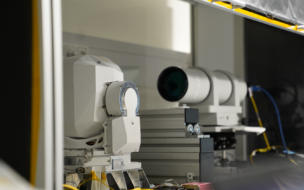Lodestar Space, a UK startup building tech for in-space security applications, is hitching a ride on Exotopic’s in-orbit mission—Give Me Some Space! (GMSS)—expected to launch in early 2026.
Payload caught up with Lodestar’s cofounder and CTO Thomas Santini to get more detail about the company’s first flight to space, which came with a £45,000 (€51,700) price tag, and its long-term vision for orbital-defense tech.
“UK Space Command [is] looking for more and more space control. It’s their No. 1 priority. And so, for us as a company, we see that as our first real opportunity to go after. The first real problem to solve,” Santini told Payload.
The mission: Lodestar needs to demonstrate at least three foundational capabilities that will be required for attack and defend missions in space: a set of eyes, a brain, and the ability to interact with the environment.
Onboard GMSS, Lodestar is sending the first iteration of its Mithril product, which has a suite of machine vision sensors and an edge-compute platform—essentially, the eyes and the brain. Future iterations of Mithril will also include effectors, and the company has plans to integrate a robotic arm for in-space RPO capabilities.
During the mission, Mithril will deploy a boom stick, similar to those used for in-space selfies, to demonstrate Mithril’s ability to image satellites in space against a variety of backgrounds. The boom stick will have a variety of materials attached to it, to test Mithril’s ability to image and gain insights for objects on-orbit.
“It’s really like getting that weapons-grade data,” Santini said. “What is the thing I’m looking at? Where is the point that I can grab? What is the weak point? What is the intent? How much fuel does it have on board? What payloads is it riding on?”
Lego Star Wars: As conflicts increasingly involve space-based assets, and Russia and China continue to demonstrate their own defensive capabilities in space, Lodestar’s aim is to give allied space commands a fully autonomous bodyguard in orbit. This platform could perform attack and defend maneuvers in contested and jammed environments.
And Lodestar isn’t just building for defense. Once it’s demonstrated all of Mithril’s planned capabilities, Lodestar wants to assist on future civil and commercial ISAM missions.





